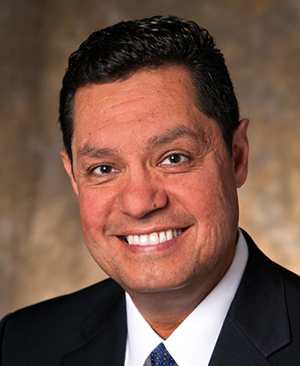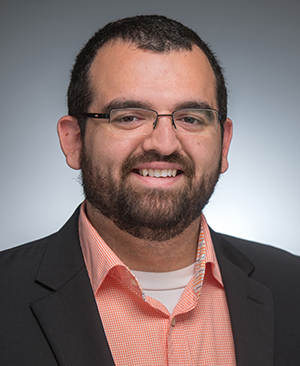The latest faculty hires in Notre Dame’s Department of Political Science bring expertise in the fields of Latino and American politics.
Luis Ricardo Fraga, a heralded scholar and pioneer in the study of Latino politics, has been named the Professor in Transformative Latino Leadership in the Institute of Latino Studies (ILS) and a professor in the Department of Political Science. Gary E. Hollibaugh, Jr., whose research focuses on American political institutions, joined the department this year as an assistant professor.
“Last year was a banner year for political science in terms of hiring terrific scholars at both the apex and the beginning of their careers,” said Michael Desch, professor and chair of the department. “My colleagues and I are absolutely thrilled that one of the country’s most distinguished experts on Latino Politics—Luis Fraga—has come back to Notre Dame. With this transformative senior hire, Notre Dame has become the place to study this important topic for our country and Church.
“In addition, we are pleased to have a young methodologist—Gary Hollibaugh—come on board to help the department stay on the cutting edge of quantitative studies of politics. The two of them epitomize how Notre Dame’s Department of Political Science is building strength at every level of the faculty.”
Understanding Latino Identities
 Luis Fraga
Luis Fraga
Fraga’s research is in the field of American politics, where he specializes in the politics of race and ethnicity, Latino politics, immigration policy, education politics, voting rights, and urban politics.
His most recent work, Latinos in the New Millennium: An Almanac of Opinion, Behavior, and Policy Preferences, draws on data from the groundbreaking 2006 Latino National Survey to create a comprehensive profile of Latino political life in the United States.
Fraga was one of six principal investigators of the survey—the largest and most detailed source of data on Hispanics in America. This study, he said, displays the complexity of Latinos, from recent immigrants to those whose grandparents were born in the United States.
He and his coauthors are now completing a new book titled Invisible No More: Latino Identities in American Politics, where they argue that Latinos see themselves in the U.S. as members of individual ethnic groups by country of origin, and as members of a pan-ethnic Latino community, and as Americans.
It is this reality of multiple identities, he said, that “presents the nation with a new way of understanding how difference and commonality can coincide to make the country even stronger as it continues to experience substantial demographic shifts.”
In 2011, Fraga was appointed to the President’s Advisory Commission on Educational Excellence for Hispanics, where he has helped to develop action plans to increase educational opportunities and improve the educational attainment of Latino students—who now comprise 25 percent of all students enrolled in public schools.
Fraga came to Notre Dame from the University of Washington where he was associate vice provost for faculty advancement, Russell F. Stark University Professor in the Department of Political Science, and director of the Diversity Research Institute.
This spring, he is teaching a course titled Latinos in the Future of America: Building Transformative Leadership. Students in the course will have the opportunity to interact with invited leaders from business, arts, education, community organizing, entertainment, medicine, religion, law, politics, and other areas. There will also be a number of campus-wide events featuring these speakers.
“My classroom, I hope, is a safe place where all students can freely and fully explore their own capacities to be rich and fulfilled citizens in their communities today and tomorrow,” Fraga said.
Whether contributing on the national policy stage, advocating for educational opportunities, writing, or teaching in the classroom, Fraga said his work is grounded in his Catholic faith and fully aligned with Notre Dame’s mission.
“I am blessed to be at a university where one can talk about normative conflicts, value inconsistencies, the need for self-reflection, and the love of one’s fellow human as part of one’s research, teaching, and service,” he said.
“Some institutions of higher education are uniquely positioned to ask the hard questions, work to find better informed answers, and empower faculty and students to know their consciences. Notre Dame is exactly such an institution.”
Linking Polarization, Personality, and Political Institutions
 Gary E. Hollibaugh, Jr.
Gary E. Hollibaugh, Jr.
Hollibaugh specializes in American political institutions with an emphasis on the relationship between the executive and legislative branches.
“Broadly speaking, I investigate how executives and legislators respond to electoral and institutional constraints when choosing individuals to serve in appointed positions, the importance of individual personality traits in this process, and how these factors interact to influence public opinion,” he said.
He traces his interest in American institutions to the year he spent working in a San Diego law firm after receiving his undergraduate degree from the University of California, San Diego.
“That year, the U.S. Attorneys dismissal controversy occurred, and those of us in the office and in the larger legal community in San Diego were baffled, as our U.S. Attorney, Carol Lam, was one of those asked to resign,” Hollibaugh said.
The controversy caused him to begin thinking seriously about the politics-administration dichotomy, he said. “I began to focus on why certain people are appointed to certain positions, and the tradeoffs between loyalty, competence, and other political factors that go into each decision. I’ve since begun to examine the importance of personality as well.”
Hollibaugh, who received his Ph.D. in political science from the University of Rochester in 2012, is currently working on a book titled More Than a Feeling: Personality, Polarization, and the Transformation of the U.S. Congress with coauthors Adam J. Ramey and Jonathan D. Klingler.
“As the members of the Democratic and Republican parties have become more ideologically cohesive, polarization has risen and politics has become more volatile,” he said. “No place is this more clear than in the halls of the United States Congress.
“In More Than a Feeling, we argue that to understand this latest phase in polarization, we need to look beyond the standard accepted story of legislative behavior as merely a function of ideological preferences and electoral concerns. Drawing on recent advances in experimental economics and psychology, we provide a way for measuring personality traits and show that these individual differences can explain a wide variety of legislator behavior.”
Before coming to Notre Dame last fall, Hollibaugh was most recently a visiting assistant professor in the Department of Public Administration and Policy at the University of Georgia.
He is currently teaching an undergraduate course on the political and legislative processes of the U.S. Congress, as well as a graduate course on quantitative research methods in political science.
“I chose Notre Dame largely because of the strength of the faculty—particularly in my area of American politics, which was further strengthened by the hire of Luis Fraga. I was also impressed with the quality of the students and the resources available from a university with such a prominent national profile.”


